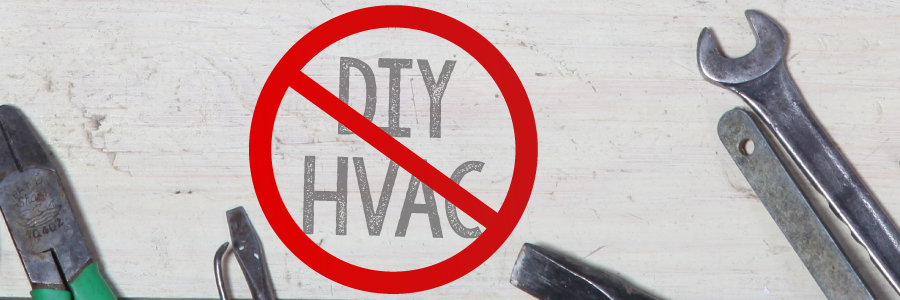
As a do-it-yourself (DIY) enthusiast, you may be able to paint a room, install a ceiling fan, or even change the oil in your car. But heating, ventilation and air conditioning (HVAC) installation and repairs should be left to the professional licensed HVAC dealer!
Creating comfortable indoor temperatures is a delicate balancing act between equipment, air flow, and mechanics. A qualified licensed HVAC contractor is crucial to quality installations and repairs.
But I Watched a “HOW TO HVAC” Video…
There are many DIY’ers that watch a YouTube video and believe that they can install or repair a product. But for home heating and cooling systems, it takes more than “How To” videos to become a professional licensed HVAC technician. Professional experience plays a major role in safely and successfully installing and repairing your HVAC equipment. In some areas of the country, technicians are required to be licensed. DIY HVAC may not be worth the costly consequences.
Required Qualifications and Skills
Residential HVAC systems are complex systems with many components. Dealers often have years of training before they become experts in residential indoor comfort systems. In some locations, HVAC contractors must register for a professional HVAC license and/or pass tests for applicable certifications.
As new products and engineered technologies are introduced into the HVAC world, licensed or professional HVAC technicians often receive additional training. This training may expand their skill set and how to align product advancements to a home’s current HVAC set up. Your home’s HVAC configurations may be unique and require specific knowledge in order to properly repair or install the advanced equipment, parts or technology that is available on the market.
Dealers are often offered ongoing training opportunities from HVAC manufacturers in order to keep up with the latest innovations. The unlicensed weekend DIY’er does not have the industry-specific resources, knowledge or skills that are available to HVAC professionals!
The Unlicensed DIY’er
The unlicensed DIY’er may not understand the critical components within a particular HVAC system. Installation or repair without licensed or professional HVAC technician may lead to damaged equipment, compromised system efficiency, and voided warranties. The following are a few reasons why NOT to take on DIY HVAC:
Experience and professional requirements: It’s important to make sure your local HVAC technician is experienced, qualified, and backs their work. Although residential HVAC licensing requirements vary by state, licensing can provide proof of professional training. Be sure you are working with a professional or licensed HVAC contractor who is willing to provide a limited warranty for their work and products installed. Doing the job properly the first time may help eliminate the need for repeat visits, as well as ensure your system is running at peak performance. However, a license may not reflect actual installation expertise.
Refrigerant: Environmental Protection Agency (EPA) regulations require that technicians who maintain, service, repair, or dispose of equipment that could release ozone depleting refrigerants into the atmosphere be certified in proper refrigerant handling techniques. Individuals cannot buy refrigerants without the appropriate EPA 608 Certification. Unless you have this certification, do not attempt to handle air condition coolants.
Ventilation Requirements: National, regional and local HVAC codes and manufacturers installation guidelines may have specific ventilation requirements for HVAC equipment. Your local licensed or professional HVAC contractor should have sufficient knowledge in HVAC safety code in your particular area.
Electricity: There can be shocking consequences when homeowners start working with their home’s electrical components. According to 2016 National Fire Protection Agency1, an estimated 48,000 home structure fires caused by electrical problems were reported to U.S. fire departments. Handling the wiring and electrical needs of HVAC equipment requires a trained electrician or skilled technician.
Gases: Natural gas is the most common type of home heating fuel. It provides nearly 57% of American homes with heat.2 However, it is critical that a license or professional HVAC technician properly install or repair gas heating systems per manufacturer specifications.
It’s About the Details
As mentioned, proper HVAC operation is the result of the delicate balancing act between equipment, air flow, and mechanics. Professional or licensed HVAC dealers should be trained in necessary and precise calculations such as volumes, loads, weight, flow rate, and more. If one or more variables are out of sync, the entire system’s operation and your indoor comfort may suffer. An experienced HVAC technician has the necessary tools required to calculate the right sized unit for your home, and ensure each calculation and measurement pertains to your specific HVAC needs.
HVAC systems are significant investments in your home. While DIY may seem like a good idea for your wallet, the long-term consequences may end up costing you for many years to come.

1 News Releases, NFPA emphasizes importance of electrical fire safety during National Electrical Safety Month. (2016, May 3). Retrieved from National Fire Protection Association: http://www.nfpa.org/news-and-research/news-and-media/press-room/news-releases/2016/nfpa-emphasizes-importance-of-electrical-fire-safety-during-national-electrical-safety-month
2 Energy saver 101: Home Heating. (n.d.). Retrieved from Energy.Gov: https://energy.gov/articles/energy-saver-101-infographic-home-heating